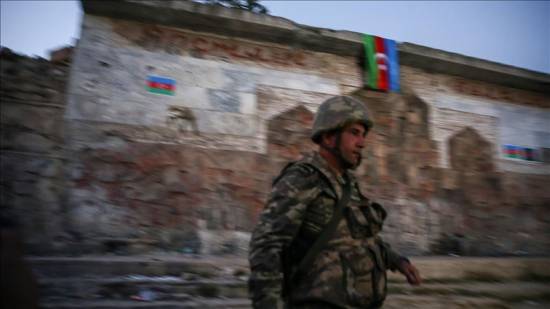Armenia plans to use phosphorus munitions: Azerbaijan
ANKARA(AA)
Azerbaijan on Saturday rejected Armenia’s “false and fake” claims that its forces used white phosphorus munitions in Upper Karabakh, saying that it is Yerevan that actually intends to use the illegal weapons.
Armenia is attempting to lay the basis for further provocations by delivering phosphorus cargo to the territory of Khojavend, the Azerbaijani Defense Ministry said in a statement.
Citing intelligence data, the ministry said Armenia is likely to use the “phosphorus-containing ammunition” against the Azerbaijani army.
“The Armenian side lays the basis for its further provocations by spreading on Oct. 30 false and fake information about the alleged use of weapons containing white phosphorus by the Azerbaijan Army,” read the statement.
“We declare once again that the Azerbaijan Army does not have any prohibited ammunition in its armament.”
Military gains
Clashes continued in the Agdere, Khojavend, and Gubadli directions of the front on Saturday, according to Azerbaijan’s Defense Ministry.
Armenian forces tried to target the cities of Tartar, Agdam, and Aghjabadi, it said in a statement.
Azerbaijani forces destroyed two more Armenian tanks, three armored vehicles, four missile systems, 12 howitzers, one anti-aircraft missile system, one radar, and two vehicles, it added.
The front is under the Azerbaijani army’s control, the ministry said.
Upper Karabakh conflict
Relations between the two former Soviet republics have been tense since 1991, when the Armenian military occupied Upper Karabakh, or Nagorno-Karabakh, an internationally recognized territory of Azerbaijan.
Four UN Security Council resolutions and two from the UN General Assembly, as well as international organizations, demand the “immediate complete and unconditional withdrawal of the occupying forces” from occupied Azerbaijani territory.
In total, about 20% of Azerbaijan's territory – including Nagorno-Karabakh and seven adjacent regions – has been under illegal Armenian occupation for nearly three decades.
The Organization for Security and Co-operation in Europe (OSCE) Minsk Group – co-chaired by France, Russia, and the US – was formed in 1992 to find a peaceful solution to the conflict, but to no avail. A cease-fire, however, was agreed to in 1994.
World powers, including Russia, France, and the US, have called for a new cease-fire. Turkey, meanwhile, has supported Baku's right to self-defense and demanded the withdrawal of Armenia's occupying forces.


